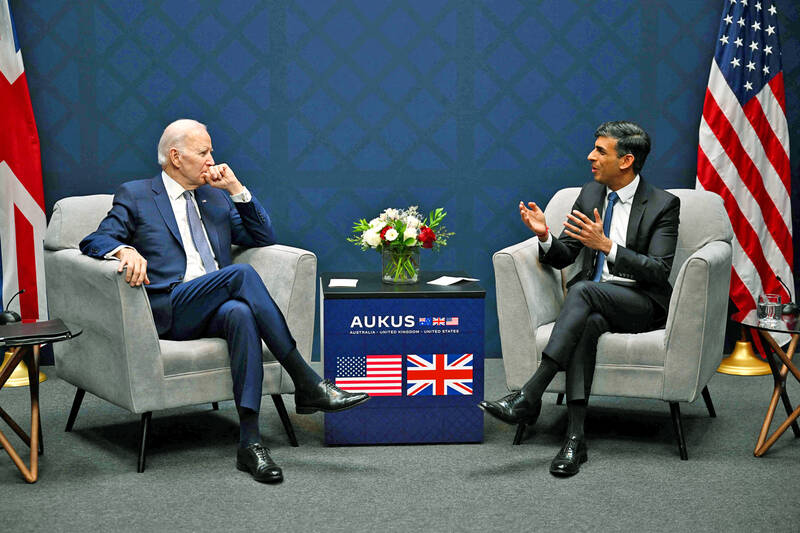The UK voiced support for peace and stability across the Taiwan Strait in a policy report published on Monday that mentioned Taiwan for the first time.
The Integrated Review Refresh 2023, which is built on the 2021 Integrated Review of Security, Defence, Development and Foreign Policy, is an effort to guide the UK’s national security strategy in a “more contested and volatile world.”
China’s growing aggression in the South China Sea and the Taiwan Strait is “threatening to create a world defined by danger, disorder and division — and an international order more favorable to authoritarianism,” Monday’s report said.

Photo: AP
China has “pursued rapid and opaque military modernization with huge new investments, militarized disputed islands in the South China Sea and refused to renounce the use of force to achieve its objectives with regard to Taiwan,” it said.
The China policy mapped out in the report reiterated the UK’s long-standing position that “the Taiwan issue should be settled peacefully by people on both sides of the Taiwan Strait through dialogue and not through any unilateral attempts to change the status quo.”
It also condemned Beijing’s coercion against Vilnius by imposing economic sanctions after it opened the Taiwanese Representative Office in Lithuania, the first office in Europe to be called “Taiwanese.”

Photo: AFP
The Chinese Communist Party strengthening its partnership with Russia, and continuing to disregard universal human rights in Tibet, Xinjiang and Hong Kong are also serious causes for concern, it said.
The UK vowed to bolster collective security with core allies and international partners to oppose behaviors that undermine international law, violate human rights or seek to coerce or create dependencies, it said.
In Taipei yesterday, the Ministry of Foreign Affairs said in a statement that it “highly welcomed and sincerely appreciated” the pro-Taiwan rhetoric in the Integrated Review Refresh report.
The UK shares Taiwan’s values of democracy, freedom, human rights and the rule of law, the ministry said, adding that the government would continue to “strengthen mutually beneficial and substantive friendly relations with like-minded countries such as the UK, based on the already solid foundation.”
In related news, British Prime Minister Rishi Sunak on Monday announced that the UK is doubling funding for next year and 2025 to further boost skills and knowledge for government staff on China.
The funding is to support the cross-department “China Capabilities Program,” which aims to provide training on economic and military policy as well as Chinese-language skills, Sunak’s office said in a statement.
The UK launched a pilot program last year based on the 2021 Integrated Review to provide training in Mandarin to 170 civil servants, with 20 going through a language immersion program in Taiwan, it said.
The increased financial support can help “boost knowledge and language skills across government, in the face of the systemic challenge that China poses to the UK’s security, prosperity and values,” British Secretary of State for Foreign, Commonwealth and Development Affairs James Cleverly said.

Taiwan is projected to lose a working-age population of about 6.67 million people in two waves of retirement in the coming years, as the nation confronts accelerating demographic decline and a shortage of younger workers to take their place, the Ministry of the Interior said. Taiwan experienced its largest baby boom between 1958 and 1966, when the population grew by 3.78 million, followed by a second surge of 2.89 million between 1976 and 1982, ministry data showed. In 2023, the first of those baby boom generations — those born in the late 1950s and early 1960s — began to enter retirement, triggering

ECONOMIC BOOST: Should the more than 23 million people eligible for the NT$10,000 handouts spend them the same way as in 2023, GDP could rise 0.5 percent, an official said Universal cash handouts of NT$10,000 (US$330) are to be disbursed late next month at the earliest — including to permanent residents and foreign residents married to Taiwanese — pending legislative approval, the Ministry of Finance said yesterday. The Executive Yuan yesterday approved the Special Act for Strengthening Economic, Social and National Security Resilience in Response to International Circumstances (因應國際情勢強化經濟社會及民生國安韌性特別條例). The NT$550 billion special budget includes NT$236 billion for the cash handouts, plus an additional NT$20 billion set aside as reserve funds, expected to be used to support industries. Handouts might begin one month after the bill is promulgated and would be completed within

NO CHANGE: The TRA makes clear that the US does not consider the status of Taiwan to have been determined by WWII-era documents, a former AIT deputy director said The American Institute in Taiwan’s (AIT) comments that World War-II era documents do not determine Taiwan’s political status accurately conveyed the US’ stance, the US Department of State said. An AIT spokesperson on Saturday said that a Chinese official mischaracterized World War II-era documents as stating that Taiwan was ceded to the China. The remarks from the US’ de facto embassy in Taiwan drew criticism from the Ma Ying-jeou Foundation, whose director said the comments put Taiwan in danger. The Chinese-language United Daily News yesterday reported that a US State Department spokesperson confirmed the AIT’s position. They added that the US would continue to

The National Development Council (NDC) yesterday unveiled details of new regulations that ease restrictions on foreigners working or living in Taiwan, as part of a bid to attract skilled workers from abroad. The regulations, which could go into effect in the first quarter of next year, stem from amendments to the Act for the Recruitment and Employment of Foreign Professionals (外國專業人才延攬及僱用法) passed by lawmakers on Aug. 29. Students categorized as “overseas compatriots” would be allowed to stay and work in Taiwan in the two years after their graduation without obtaining additional permits, doing away with the evaluation process that is currently required,